Lost diary details Lincolnshire soldier's life and death in the trenches of the First World War
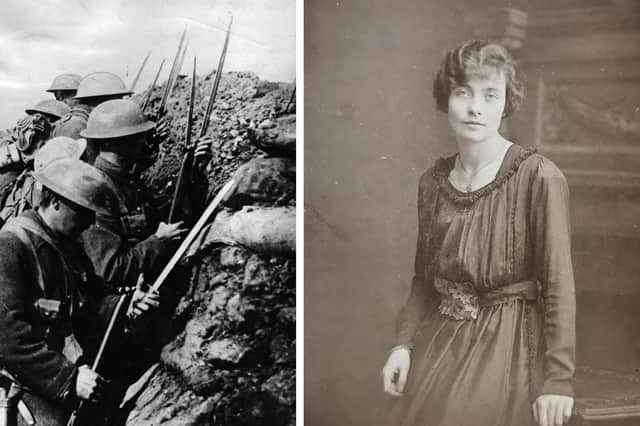

To mark tomorrow’s Armed Forces Day, we recall how the 1916 diary details the hardships and brief moments of happiness felt by rifleman William P. Tredinnick who fought in the Battle of the Somme - thought to be the deadliest of the war and one of the bloodiest in human history.
The 20 year-old soldier made diary entries from January 1 - up until his final sad entry on October 13 saying goodbye to his sweetheart as he died. It includes details about having to march up to 18 miles a day, digging trenches under shell fire and sleeping in rat-infested ‘dug-outs’.
The diary was discovered by a Kent man - who is now hoping to give it to surviving relatives of Mr Tredinnick.
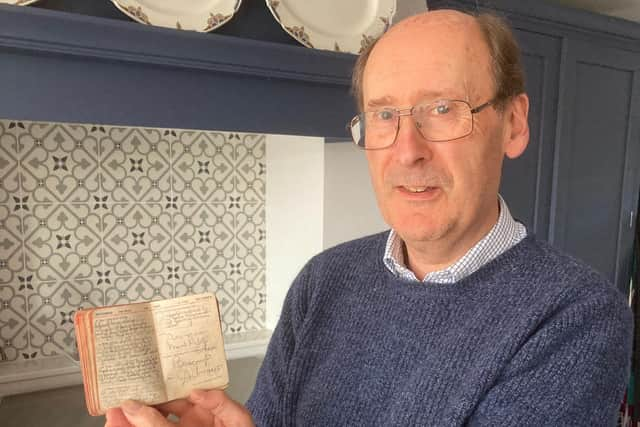

Chris Mattocks found the diary amongst his grandparent’s belongings when clearing out their loft.
“Going through my grandfather’s ancient trunk I found a 1916 diary of a man in the trenches right up to his death later in the year,” said Mr Mattocks. “Reading through this rather sad diary, he was clearly my grandmother’s boyfriend as her name and address in Boston appears in it. She later married my grandfather who was also a Boston local.”
Mr Mattocks’ grandmother Bertha Flory is referred to several times in William’s diary - which begins with happier times when the young soldier is on medical leave back in England before returning to his hometown. During this time he went on dates with Miss Flory - even detailing a moon-lit walk home with her one night.
It begins on January 1, 1916, with an entry about arriving in England from France and being sent to hospital: “Very glad to have reached home again, safe. Hope when I do go out again I shall be enabled to return again,” he wrote.
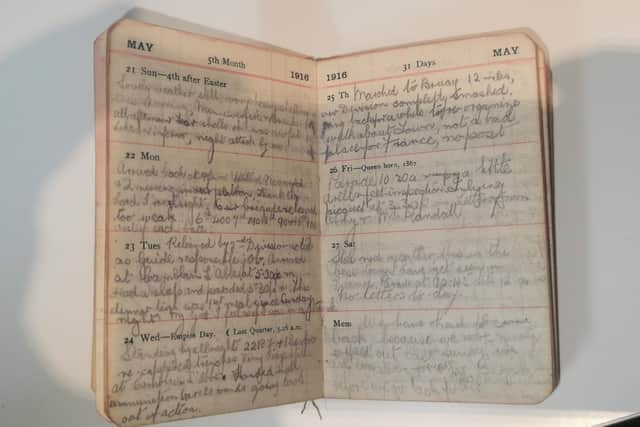

On the weekend of February 5-6 he wrote: “Arrived home on 10 days leave - hurrah. It’s jolly to be home. Waiting for the time when I shall be home for good. Went for a look around Boston - still looks the same.”
On February 11 he writes about going out with Bertha, adding: “Saw Bertha home - very nice too with the moonlight - ideal for this sort of thing.”
The next day he met her again, adding: “Lovely day. Had to walk to Kirton with Bertha. Had tea at Hildreds, and rode home. I have had a jolly fine time. My thanks to Dad, Mater, and Miss Flory for their united successful efforts to give me a good time.”
But on February 17, he comments: “Back to humdrum life in an Army barracks in war time, nothing else but drill and fatigue.”
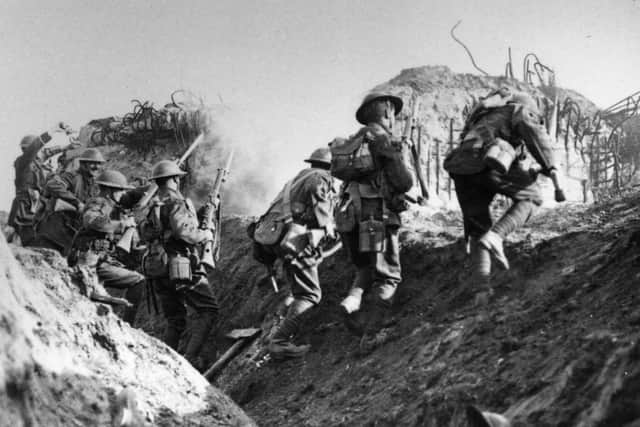

Over the next few weeks and months he details various parades, and gruelling marches despite suffering various ailments including ‘spotted fever’, stomach pains, eye problems and what he believed to be ‘blood poisoning’.
The following are diary excerpts from May:
May 9: “18 mile march just about beat me.”
May 12: “Had a lucky escape from a sniper.”
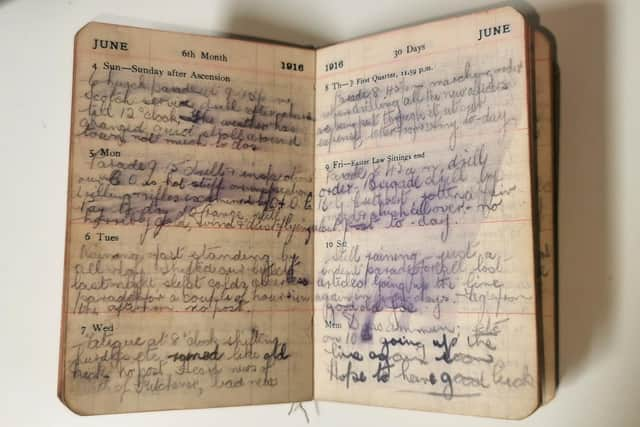

May 13: “Raining. Everything is awfully muddy.”
MEM - “I captured the German front line last night. It’s been cushy here.”
May 21: “Still very heavy shelling this morning. Mineworkers bombs, all afternoon fear shells. Oh! was awful - like an inferno.”
May 22: “Arrived back at [unintelligible] 1 killed, 8 wounded and 2 missing in our platoon. Thank the Lord I was alright. Our brigade relieved - too weak.”
May 25: “Marched to Bruay 12 miles, our Division completely smashed.”
Mem: “We had to come back because we were nearly wiped out last Sunday.”
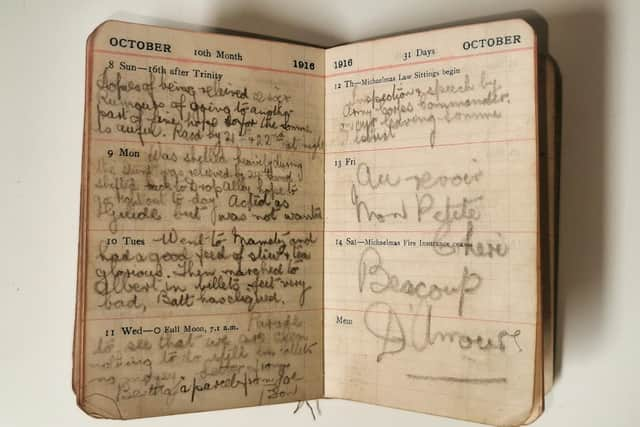

Excerpts from June and July read:
June 17: “Ammunition carrying of stuff going up the line. Awful march through miles of trenches.”
Mem: “Have a good dug out here. A bed for two, but there are so many damned rats knocking about.”
June 25: “The water has given us awful internal pains. The latrine is constantly occupied.”
July 2: “Terrible pains in body today, but no limp.”
July 3: “Feel better today but still can’t use my bowels. Still plenty of casualties coming in from the line.”
On July 6 he talks about having rejoined the platoon, commenting: ”The Boys came in about 4am covered in mud and glory.”
July 23: “Still on guard, Good grub and an easy job. Have had awful pains in leg - a touch of blood poisoning.”
July 26: “Marched to Divion about 12 miles. Rotten march, hardly any grub. It’s a rotten time we are having now.”
July 27: “Marched further on to Valhuon about 7 miles - living on biscuits and fresh air.”
On July 31 he tells of how ‘four chaps dropped dead on one of the marches, due to the heat. But the very next day he was ordered to march a further 15 miles.
Three days later they marched again, for 10 miles to Yvrench, leaving at 4.30am with no breakfast.
August 25 saw William “trench digging under shell fire.”
Excerpts from his last two months of September and October read:
September 9: “Our attack takes place in a few days time, I hope I come through alright. Still, if I don’t, well I couldn’t have had a better death.”
Sept 18: “Shelled to blazes all yesterday afternoon and night, went over top this morning. Took another part of German trenches.”
Sept 19: “Still in the line. No grub, only water for 2 days. Up to my eyes in mud.”
Oct 2: “Working party digging roads, rained and drowned us. Came back to our shelter, excited to go up line.”
Oct 4: "Raining and hardly any shelter. Wish this war was over.”
Oct 7: “Shifted back to another trench. Sars captured. Got lost coming [back] and had a horrible job getting across in daylight.”
Oct 8: “Hopes of being relieved. Rumours of going to another part of the line. Hope so, for the Somme is awful.”
Oct 12: “Inspection speech by Army commander on our leaving Somme district.”
Scrawled in much larger handwriting across October 13-14, he writes his last entry: “Au revoir Mon Petite Cherie, Beaucoup D’amours” - which translates as ‘Goodbye little darling - much love’
At the back of the diary he had written Bertha’s name and address: “Miss B Flory, 14, Skirbeck Road, Boston, Lincs”.
• William’s surname was initially thought by us to be ‘Fredinnick’ due to the elaborately scrolled handwriting which makes the T look like an F. But subsequent research has revealed a William P Tredinnick, (London Regt. City of London Rifles) is recorded as having died on October 22, 1916. He is said to be buried at the White House Cemetery in Yves, Belgium.
• If you believe you are related to William P Tredinnick, or have more information about him, contact us via the email address above.